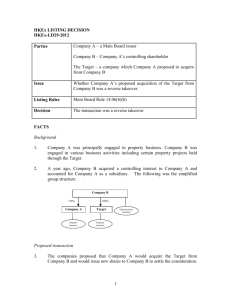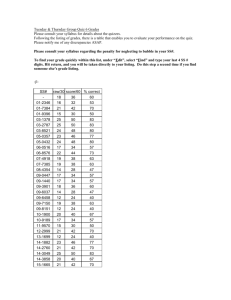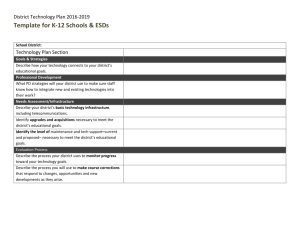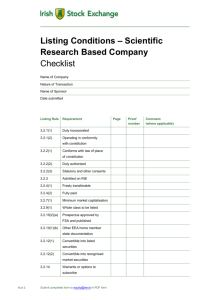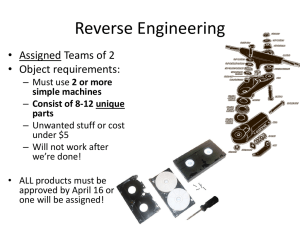LD75-1
advertisement
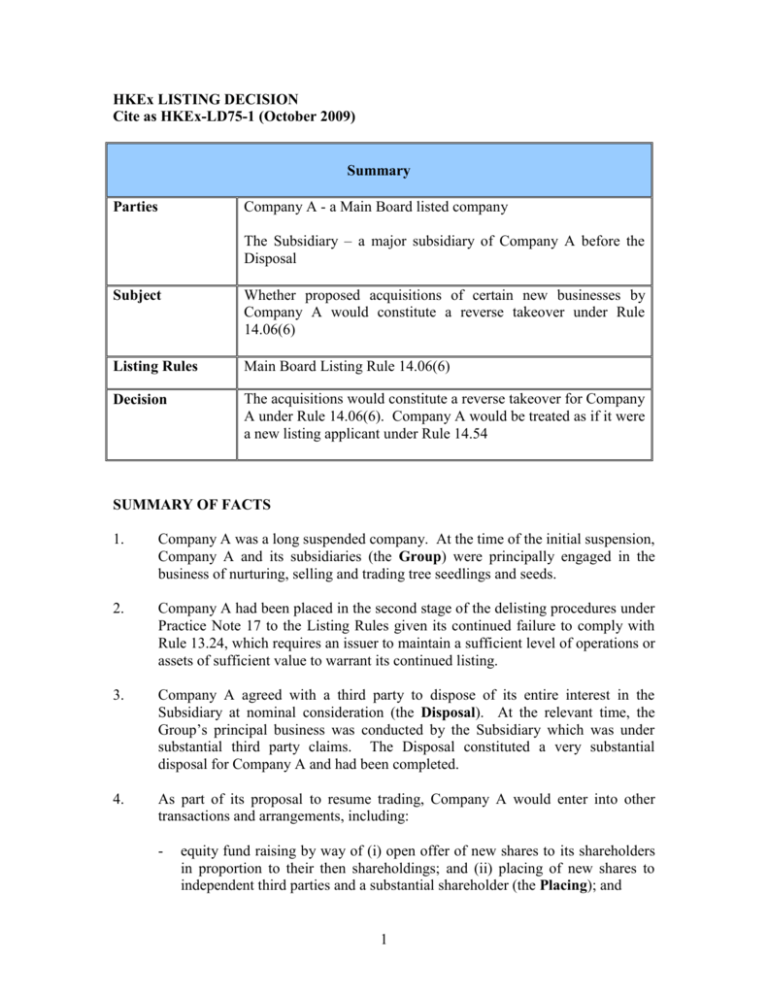
HKEx LISTING DECISION Cite as HKEx-LD75-1 (October 2009) Summary Company A - a Main Board listed company Parties The Subsidiary – a major subsidiary of Company A before the Disposal Subject Whether proposed acquisitions of certain new businesses by Company A would constitute a reverse takeover under Rule 14.06(6) Listing Rules Main Board Listing Rule 14.06(6) Decision The acquisitions would constitute a reverse takeover for Company A under Rule 14.06(6). Company A would be treated as if it were a new listing applicant under Rule 14.54 SUMMARY OF FACTS 1. Company A was a long suspended company. At the time of the initial suspension, Company A and its subsidiaries (the Group) were principally engaged in the business of nurturing, selling and trading tree seedlings and seeds. 2. Company A had been placed in the second stage of the delisting procedures under Practice Note 17 to the Listing Rules given its continued failure to comply with Rule 13.24, which requires an issuer to maintain a sufficient level of operations or assets of sufficient value to warrant its continued listing. 3. Company A agreed with a third party to dispose of its entire interest in the Subsidiary at nominal consideration (the Disposal). At the relevant time, the Group’s principal business was conducted by the Subsidiary which was under substantial third party claims. The Disposal constituted a very substantial disposal for Company A and had been completed. 4. As part of its proposal to resume trading, Company A would enter into other transactions and arrangements, including: - equity fund raising by way of (i) open offer of new shares to its shareholders in proportion to their then shareholdings; and (ii) placing of new shares to independent third parties and a substantial shareholder (the Placing); and 1 - acquisitions of certain serviced apartments and elderly home businesses (collectively the New Businesses) from independent third party vendors for cash consideration (the Acquisitions). The vendors were not shareholders of Company A and would not subscribe for new shares in Company A under the proposed Placing. 5. Since completing the Disposal, the Group had ceased to operate its original principal business. Company A intended to focus on the New Businesses. . 6. Based on the percentage ratio calculation, the Acquisitions would be a very substantial acquisition. Company A submitted that there would not be a change in control (as defined in the Takeovers Code) of Company A as a result of the Acquisitions and other transactions and arrangements contemplated in its resumption proposal. ISSUE 7. Whether the Acquisitions would constitute a reverse takeover under Rule 14.06(6). APPLICABLE LISTING RULES OR PRINCIPLES 8. Rule 14.06(6) defines “reverse takeover” as: an acquisition or a series of acquisitions of assets by a listed issuer which, in the opinion of the Exchange, constitutes, or is part of a transaction or arrangement or series of transactions or arrangements which constitute, an attempt to achieve a listing of the assets to be acquired and a means to circumvent the requirements for new applicants set out in Chapter 8 of the Exchange Listing Rules (the Preamble). A “reverse takeover” normally refers to: (a) an acquisition or a series of acquisitions (aggregated under rules 14.22 and 14.23) of assets constituting a very substantial acquisition where there is or which will result in a change in control (as defined in the Takeovers Code) of the listed issuer (other than at the level of its subsidiaries); or (b) acquisition(s) of assets from a person or a group of persons or any of his/their associates pursuant to an agreement, arrangement or understanding entered into by the listed issuer within 24 months of such person or group of persons gaining control (as defined in the Takeovers Code) of the listed issuer (other than at the level of its subsidiaries), 2 where such gaining of control had not been regarded as a reverse takeover, which individually or together constitute(s) a very substantial acquisition. … 9. Rule 14.54 provides that: the Exchange will treat a listed issuer proposing a reverse takeover as if it were a new listing applicant. The enlarged group or the assets to be acquired must be able to meet the requirements of rule 8.05 and the enlarged group must be able to meet all the other basic conditions set out in Chapter 8 of the Exchange Listing Rules. … ANALYSIS 10. Rule 14.06(6) seeks to deal with backdoor listings. Its purpose is to prevent an issuer from circumventing the new listing requirements and ensure that quality of information being disclosed to investors is of a prospectus standard. 11. A reverse takeover is defined in the preamble to Rule 14.06(6). Paragraphs (a) and (b) of the Rule provide bright line tests involving two aspects: i) to determine a change in control (which is based on the Takeovers Code); and ii) to assess an acquisition of new business/asset based on the size of the acquisition. 12. In this case, Company A submitted that the Acquisitions did not fall within paragraphs (a) or (b) of Rule 14.06(6). It was its view that the Acquisitions would not constitute a reverse takeover mainly because there would not be a change in control as a result of the Acquisitions and other transactions and arrangements contemplated in the resumption proposal. 13. The Exchange disagreed. In the Listing Committee Annual Report 2007, the Listing Committee confirmed that while paragraphs (a) and (b) of Rule 14.06(6) refer to two specific forms of reverse takeovers, these are not meant to be exhaustive. Transactions which are in substance backdoor listings but do not fall strictly within paragraphs (a) and (b) of the Rule may still be considered reverse takeovers subject to the Rules. 14. The Exchange determined that the Acquisitions would constitute a reverse takeover for the following reasons: - The Group had disposed of the Subsidiary. Thereafter, it no longer retained any material operating assets and ceased to conduct its original principal business. Company A was in substance a listed shell. - The Acquisitions formed part of a series of transactions and arrangements which constituted an attempt to achieve a listing of the New Businesses. If Company 3 A proceeded with the transactions and arrangements as submitted in its then resumption proposal, the new listing requirements would be circumvented. DECISION 15. The Acquisitions would constitute a reverse takeover for Company A under Rule 14.06(6). Company A would be treated as if it were a new listing applicant under Rule 14.54. 4
